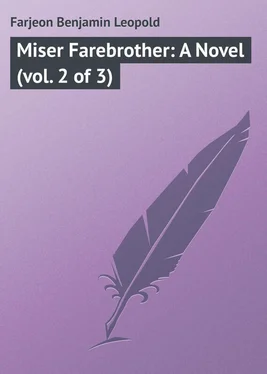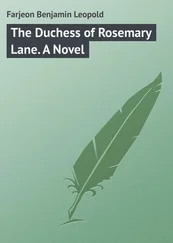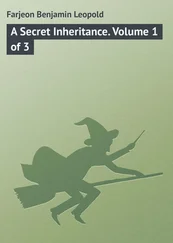Benjamin Farjeon - Miser Farebrother - A Novel (vol. 2 of 3)
Здесь есть возможность читать онлайн «Benjamin Farjeon - Miser Farebrother - A Novel (vol. 2 of 3)» — ознакомительный отрывок электронной книги совершенно бесплатно, а после прочтения отрывка купить полную версию. В некоторых случаях можно слушать аудио, скачать через торрент в формате fb2 и присутствует краткое содержание. Жанр: foreign_prose, на английском языке. Описание произведения, (предисловие) а так же отзывы посетителей доступны на портале библиотеки ЛибКат.
- Название:Miser Farebrother: A Novel (vol. 2 of 3)
- Автор:
- Жанр:
- Год:неизвестен
- ISBN:нет данных
- Рейтинг книги:3 / 5. Голосов: 1
-
Избранное:Добавить в избранное
- Отзывы:
-
Ваша оценка:
- 60
- 1
- 2
- 3
- 4
- 5
Miser Farebrother: A Novel (vol. 2 of 3): краткое содержание, описание и аннотация
Предлагаем к чтению аннотацию, описание, краткое содержание или предисловие (зависит от того, что написал сам автор книги «Miser Farebrother: A Novel (vol. 2 of 3)»). Если вы не нашли необходимую информацию о книге — напишите в комментариях, мы постараемся отыскать её.
Miser Farebrother: A Novel (vol. 2 of 3) — читать онлайн ознакомительный отрывок
Ниже представлен текст книги, разбитый по страницам. Система сохранения места последней прочитанной страницы, позволяет с удобством читать онлайн бесплатно книгу «Miser Farebrother: A Novel (vol. 2 of 3)», без необходимости каждый раз заново искать на чём Вы остановились. Поставьте закладку, и сможете в любой момент перейти на страницу, на которой закончили чтение.
Интервал:
Закладка:
"Be wise, be wise, Jeremiah," said Miser Farebrother, in response to this complaint. "You are but a novice with these people. Take a lesson from me, and learn to wait with patience. Before a good general strikes a blow, he lays his plans, and satisfies himself that everything is in order. Do I know how to act, eh? Have I already entangled and confused them, or have I not? I shall be a subject of discussion among them. 'He was flinging stones at us all the time he was speaking,' the Lethbridges will say. 'He said the most sarcastic things.' Who will defend me? The sharp lawyer, Mr. Cornwall, and, better than all, my daughter Phœbe. 'You are mistaken,' she will say; 'I am sure you are mistaken. He has been kindness itself; you do not understand him.' Then she will appeal to Mr. Cornwall, and ask him whether I did not speak in the most beautiful way of her aunt and uncle, and he will be able to make but one answer. That will silence them; they won't have a word to say for themselves. Ha, ha! I am really enjoying the game."
He kept Jeremiah with him until the Lethbridges and Fred Cornwall were gone, and then sent him back to London, bidding him not to take the same train as Phœbe's relatives.
It was between ten and eleven o'clock when Phœbe received a message from her father, through Mrs. Pamflett, bidding her come to him and wish him good-night. Phœbe had been sitting at the open window of her bedroom, musing upon the happy day fast drawing to an end. A tender light bathed the grounds of Parksides, and seemed to the happy girl to be an omen of the future – a future of love and peace. The soft breeze kissed her, and whispered to her of love; the silence of nature was eloquent with the immortal song; a tremulous joy possessed her soul. "He loves me! he loves me! he loves me!" This was the song sung by her heart, bringing light to her eyes, blushes to her cheeks, and causing her, from a very excess of joy, to hide her face in her hands. "How sweet, how beautiful is the world!" she said only to herself. "How good everybody is to me!" She rose from these musings to attend her father. Mrs. Pamflett accompanied her to the door of his apartment.
"Good-night," she said to the young girl.
"Good-night, Mrs. Pamflett," said Phœbe; "and thank you for all you have done to-day."
"I am glad you are pleased with me. May I call you Phœbe?"
"Yes, if you like."
"May I kiss you?"
"Yes," said Phœbe, with a bright look; and she received and returned the kiss.
"This is the commencement of a happy time for you, Phœbe." She had heard from her son all the particulars of the agreement entered into by him and Miser Farebrother.
Phœbe glanced shyly at her, and thought, "Does she know about Mr. Cornwall? Does everybody know?" She answered Mrs. Pamflett's remark aloud: "I am sure it is. Oh, Mrs. Pamflett, I am happy – very, very happy!"
"I am delighted to hear you say so. Good-night again, Phœbe."
"Good-night, Mrs. Pamflett."
When she was in her father's room, with the door closed, what reason had Phœbe to suppose that Mrs. Pamflett was crouching down outside, to catch what passed between Miser Farebrother and his daughter?
"Come and sit beside me, Phœbe," said Miser Farebrother. "So – the birthday is over?"
"Nearly over, father."
"And your friends have gone away contented?"
"Yes, father."
"Those flowers look well in your dress. What flowers are they? Ah, I see – white daisies and roses. Who gave you the daisies?"
"A poor friend in the village sent them to me." Knowing that her father was incensed against Tom Barley, she did not dare to mention his name.
"And the roses, Phœbe?"
"Mr. Cornwall gave them to me," said Phœbe, timidly.
"Can you spare me one?"
She gave it to him gladly, and he stuck it in his coat. Phœbe's heart beat quick. Every sign that came to her was in harmony with its throbbing.
"I am sorry for your sake, Phœbe, that I am not younger and stronger."
"Dear father! I grieve that you suffer so! If I only knew what to do to make you well!"
"That is spoken like a dutiful child. All that you can do is not to worry me – not to give me pain."
"Indeed, indeed, father," said Phœbe, earnestly, "I will never do that!"
"You are a good girl. It is strange that it was only the other day I suddenly discovered you were a woman. The change brings other changes; and I, your father, must not be blind to the fact. Why, Phœbe," he said, gaily, "it is more than likely that one day you will marry!" Phœbe hung her head. "You blush! – as your dear mother used to blush when she and I were talking of love. I did my best to make her happy. She died too soon for you and me!" He sighed, and paused a moment. "And now, Phœbe, I am both mother and father to you."
"Yes, dear father."
"I have only one wish in life, Phœbe – your happiness: and we must bring it about. It has happened sometimes that you have not seen me in a right light; I have said things which may have laid me open to misconstruction. They have not really come from my heart; I have been so tortured with pain that I scarcely knew what I was saying. Will you forgive me, Phœbe?"
"Dear father, I love you!"
"You are my own child, your sainted mother's child! Before she died she spoke to me of the time when you would be a woman, and when changes were before you. The duty you owed to her, you owe also to me."
"I shall never be wanting in it, father."
"You will marry – of course you will marry. You will ask for my consent, like a dutiful, loving child?"
"I could not be happy without it, father," said Phœbe, in a low tone. His voice was so benevolent, so imbued with concern for her happiness, that her heart went out to him.
"That is a promise, my dear child?"
"Yes, dear father, it is a promise."
"That you will not marry without my consent. Phœbe, this loving conversation is doing me good; it is better than all the doctors in the world: I am feeling almost well." He folded her in his arms and kissed her. "Why, what is this? A Prayer-book. Your mother's, my dear, which we read together when we went to church. She is looking down upon us now; she will guard you in your dreams to-night. Kiss this sacred book, my child, and repeat what you have promised – that you will not marry without my consent."
Without hesitation Phœbe took the book in her hand and kissed it, saying, as she did so, "Dear father, I will never marry without your consent." She laid the book upon the table, and burst into a flood of happy tears.
"Good child, good child!" said Miser Farebrother – "your sainted mother's child. Now go; I am exhausted. Good-night, Phœbe. May you have happy dreams."
Phœbe tenderly embraced him, and went to her room, the happiest of happy girls. While Miser Farebrother rubbed his hands, and muttered gleefully, "Mr. Cornwall, my cunning lawyer, and my dear sister and brother-in-law, I think I have scotched your little scheme." He went to bed in a perfectly happy frame of mind. He had done a good night's work.
On a little table by Phœbe's bed were Fred Cornwall's and Tom Barley's flowers. She kissed Fred's flowers before she blew out the light, and even in the dark she drew them to her lips, and so fell asleep with the roses at her breast.
CHAPTER V
TOM BARLEY COMMENCES A NEW LIFE
"It's going to be performed to-morrow night, and master and missis and all the family 'll be there. I 'eerd it read. It was beautiful. It give me the creeps, and it made me laugh just as if I was being tickled to death!"
The speaker was 'Melia Jane; the person she was addressing was Tom Barley; the place was the kitchen of Mrs. Lethbridge's house in Camden Town; and the subject of 'Melia Jane's remarks was Mr. Linton's comedy-drama A Heart of Gold , the first representation of which was to take place on the following evening at the Star Theatre. The whole house was in a flutter of excitement about it; the cousins were in the sitting-room above, busy over their frocks; Fred Cornwall was there, and was to accompany them to the theatre; the ticket for the stage-box was placed in a conspicuous position on the mantel-shelf, so that it should not escape the attention of any chance visitor; the conversation was animated, and full of hopeful anticipations of a great success for the poor dramatic author; and what was perhaps of greater importance than all else, Bob was in the cast. He had taken the fatal plunge, and through Kiss's influence had obtained an engagement for the run of A Heart of Gold . The "screw," as he called it, was small – ten shillings a week – but so were the parts for which, to his great disgust, he was cast. The more distinguished of the two characters he was to enact was a footman, who had to make three announcements of visitors of two words each – "Mrs. Portarlington" (a long name, that was lucky; almost as good as two or three words rolled into one), "Mr. Praxis," "Lord Fouracres." That was the extent of his part. He was greatly disappointed, having had an idea that he would be called upon to play one of the leading characters; but he was taken to task for his presumption by Kiss, who told him he might think himself lucky at being allowed to open his mouth on the stage for the first twelve months. The other character was a "guest," in which he was restricted to dumb-show, and very little of that. He unfortunately took it into his head to ask the stage-manager how he should play this dumb guest, and the answer he received, to the effect that he was to "look as little like an idiot as possible," somewhat dashed his budding aspirations. However, Kiss gave him some very good advice, and he took heart of grace, and rehearsed his six words on the stage, and also at home in the bosom of his family. Twenty times in the course of the night he would arrange the scene in which he was to appear and speak his lines, and when all was ready, would throw open the door and call "Mrs. Portarlington," upon which Fanny, as the audience, would burst into applause, which she kept up until Bob acknowledged the reception by a bow. It was perhaps fortunate that Kiss, breaking in upon the family rehearsal one evening, took the nonsense out of Bob by showing him how the thing should be done. "Make the announcements quite quietly, my lad," said Kiss; "and don't attempt to spoil the picture by thrusting yourself forward. Time enough for that when you have something to do. Remember that 'modesty is young ambition's ladder.'" "Of course I shall do as he tells me," said Bob, in confidence to Phœbe; "but did you ever know a profession in which there was so much jealousy?" Kiss found an opportunity to speak privately to the Lethbridges upon the subject of giving Bob a reception when he appeared. "For Heaven's sake," he said, "don't attempt it. Don't so much as wag your head. You don't know what a first-night audience is. Injudicious applause has ruined many a promising piece." Aunt Leth, sweet-natured as she was, was a little inclined to agree with Bob as to the dreadful amount of jealousy in the dramatic calling.
Читать дальшеИнтервал:
Закладка:
Похожие книги на «Miser Farebrother: A Novel (vol. 2 of 3)»
Представляем Вашему вниманию похожие книги на «Miser Farebrother: A Novel (vol. 2 of 3)» списком для выбора. Мы отобрали схожую по названию и смыслу литературу в надежде предоставить читателям больше вариантов отыскать новые, интересные, ещё непрочитанные произведения.
Обсуждение, отзывы о книге «Miser Farebrother: A Novel (vol. 2 of 3)» и просто собственные мнения читателей. Оставьте ваши комментарии, напишите, что Вы думаете о произведении, его смысле или главных героях. Укажите что конкретно понравилось, а что нет, и почему Вы так считаете.












